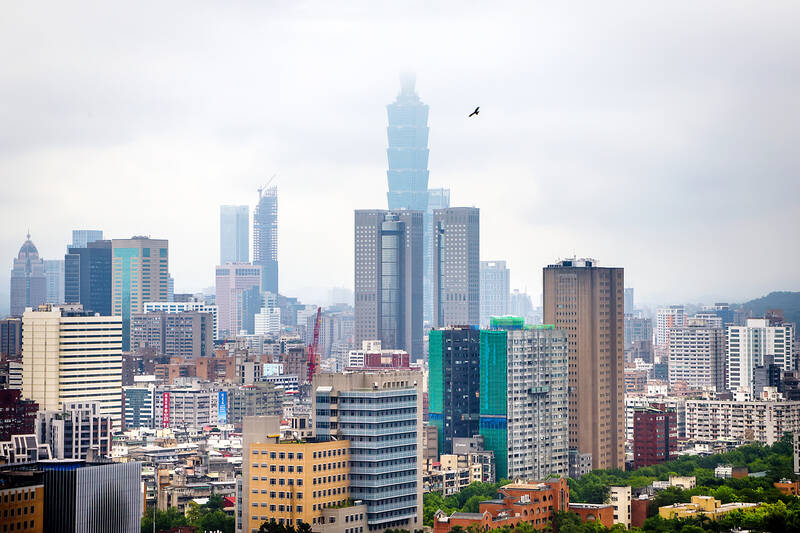Rising home prices and interest rates have prompted more people to sign up for 30-year mortgages to ease monthly debt payments, Sinyi Realty Inc (信義房屋) said yesterday.
The average mortgage length climbed to a record-high 297 months, or 24.75 years, in the fourth quarter of last year, from 291 months in the previous quarter, indicating that 30-year mortgages have become mainstream, Sinyi Realty research manager Tseng Ching-der (曾敬德) said, citing data from the Ministry of Interior’s real-estate information platform.
That means that people who buy homes at age 40 would have to pay mortgages until they turn 70, Tseng said.

Photo: CNA
Older Taiwanese liked to pay mortgages ahead of schedule to save on interest payments, but people today prefer to take advantage of Taiwan’s low interest-rate environment and extend mortgages to own a home, the analyst said.
Interest rates on mortgages were about 1.3 percent for a long time before the central bank started to tighten its monetary policy in March last year to contain inflation, Sinyi said.
Twenty-year mortgages used to be the home loan of choice and many borrowers paid way in advance, consistent with Taiwan’s high savings rates, Tseng said.
The new mindset is especially evident among young buyers of new homes in New Taipei City, Taichung and Hsinchu City, where mortgages average more than 300 months, he said.
Newly completed homes have favorable lending terms with assistance from property development companies, he said, adding that young people consider 30-year mortgages acceptable.
Rising home prices make 30-year mortgages more attractive, as they require lower monthly payments, Tseng said.
The monthly payment for a NT$10 million (US$324,538) 30-year mortgage with an interest rate of 2.06 percent is NT$37,263, much less than NT$50,873 per month for a 20-year mortgage, he said.

Taiwan will prioritize the development of silicon photonics by taking advantage of its strength in the semiconductor industry to build another shield to protect the local economy, National Development Council (NDC) Minister Paul Liu (劉鏡清) said yesterday. Speaking at a meeting of the legislature’s Economics Committee, Liu said Taiwan already has the artificial intelligence (AI) industry as a shield, after the semiconductor industry, to safeguard the country, and is looking at new unique fields to build more economic shields. While Taiwan will further strengthen its existing shields, over the longer term, the country is determined to focus on such potential segments as

UNCERTAINTY: Innolux activated a stringent supply chain management mechanism, as it did during the COVID-19 pandemic, to ensure optimal inventory levels for customers Flat-panel display makers AUO Corp (友達) and Innolux Corp (群創) yesterday said that about 12 to 20 percent of their display business is at risk of potential US tariffs and that they would relocate production or shipment destinations to mitigate the levies’ effects. US tariffs would have a direct impact of US$200 million on AUO’s revenue, company chairman Paul Peng (彭雙浪) told reporters on the sidelines of the Touch Taiwan trade show in Taipei yesterday. That would make up about 12 percent of the company’s overall revenue. To cope with the tariff uncertainty, AUO plans to allocate its production to manufacturing facilities in

COLLABORATION: Given Taiwan’s key position in global supply chains, the US firm is discussing strategies with local partners and clients to deal with global uncertainties Advanced Micro Devices Inc (AMD) yesterday said it is meeting with local ecosystem partners, including Taiwan Semiconductor Manufacturing Co (TSMC, 台積電), to discuss strategies, including long-term manufacturing, to navigate uncertainties such as US tariffs, as Taiwan occupies an important position in global supply chains. AMD chief executive officer Lisa Su (蘇姿丰) told reporters that Taiwan is an important part of the chip designer’s ecosystem and she is discussing with partners and customers in Taiwan to forge strong collaborations on different areas during this critical period. AMD has just become the first artificial-intelligence (AI) server chip customer of TSMC to utilize its advanced

Chizuko Kimura has become the first female sushi chef in the world to win a Michelin star, fulfilling a promise she made to her dying husband to continue his legacy. The 54-year-old Japanese chef regained the Michelin star her late husband, Shunei Kimura, won three years ago for their Sushi Shunei restaurant in Paris. For Shunei Kimura, the star was a dream come true. However, the joy was short-lived. He died from cancer just three months later in June 2022. He was 65. The following year, the restaurant in the heart of Montmartre lost its star rating. Chizuko Kimura insisted that the new star is still down